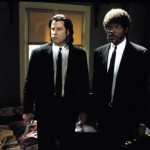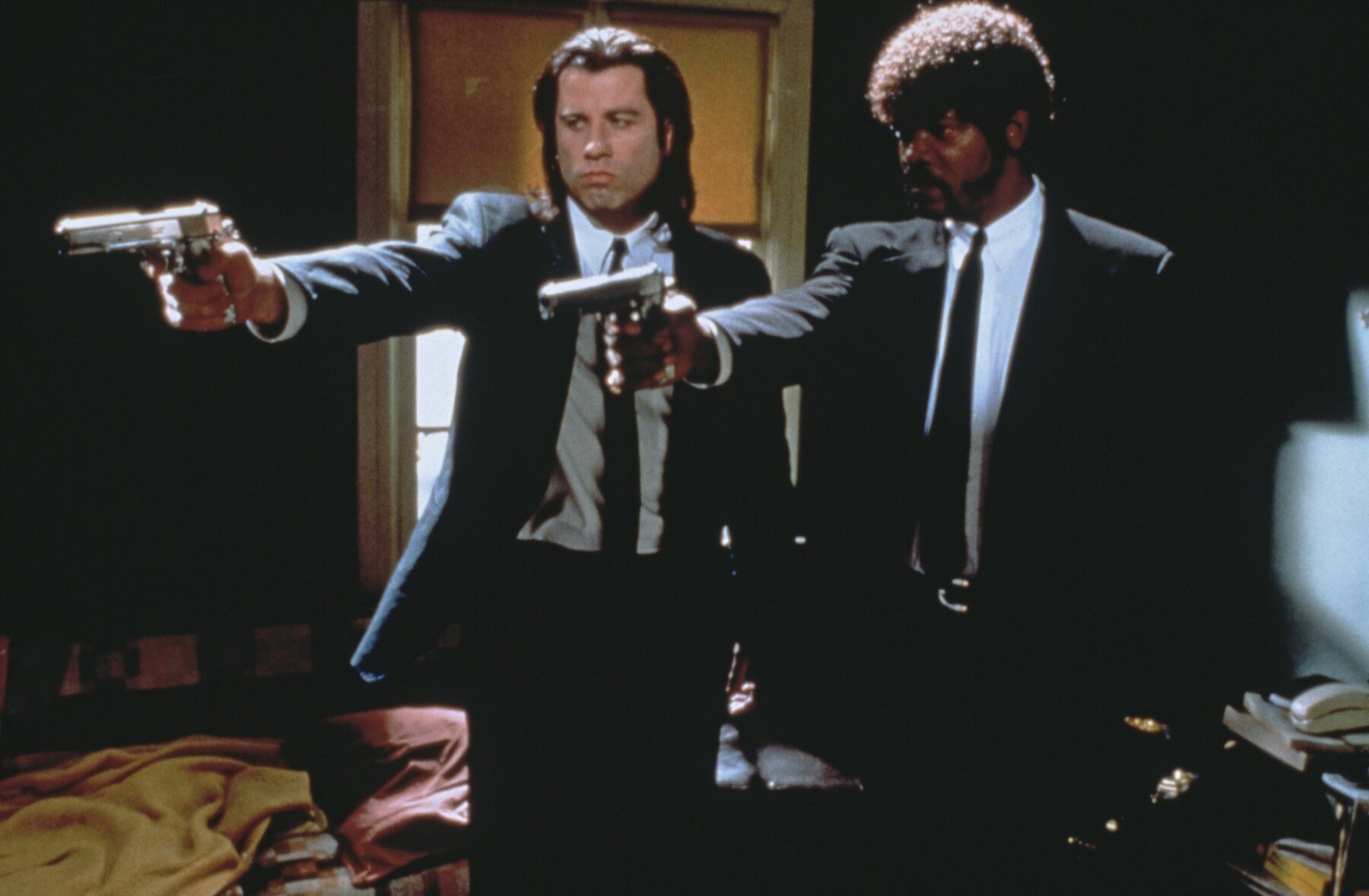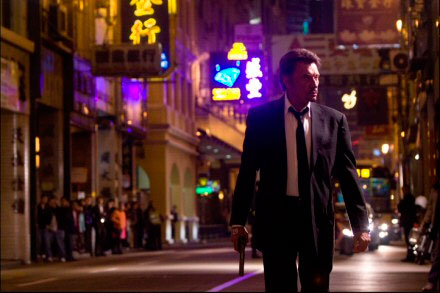Pulp Fiction is a 1994 American crime film directed by Quentin Tarantino, who cowrote its screenplay with Roger Avary. The film is known for its rich, eclectic dialogue, ironic mix of humor and violence, nonlinear storyline, and host of cinematic allusions and pop culture references. The film was nominated for seven Oscars, including Best Picture; Tarantino and Avary won for Best Original Screenplay. It was also awarded the Palme d’Or at the 1994 Cannes Film Festival. A major critical and commercial success, it revitalized the career of its leading man, John Travolta, who received an Academy Award nomination, as did costars Samuel L. Jackson and Uma Thurman.
 The Pulp Fiction script was hailed as a screenwriting triumph for its dialogue, visual grammar looping structure, and thematic irony.
The Pulp Fiction script was hailed as a screenwriting triumph for its dialogue, visual grammar looping structure, and thematic irony.
Directed in a highly stylized manner, Pulp Fiction joins the intersecting storylines of Los Angeles mobsters, fringe players, small-time criminals, and a mysterious briefcase. Considerable screen time is devoted to conversations and monologues that reveal the characters’ senses of humor and perspectives on life. The film’s title refers to the pulp magazines and hardboiled crime novels popular during the mid-20th century, known for their graphic violence and punchy dialogue. Pulp Fiction is self-referential from its opening moments, beginning with a title card that gives two dictionary definitions of “pulp”. The plot, as in many of Tarantino’s other works, is presented out of chronological sequence.
The picture’s self-reflexivity, unconventional structure, and extensive use of homage and pastiche have led critics to describe it as a prime example of postmodern film. Considered by some critics a black comedy, the film is also frequently labeled a “neo-noir”. Critic Geoffrey O’Brien argues otherwise: “The old-time noir passions, the brooding melancholy and operatic death scenes, would be altogether out of place in the crisp and brightly lit wonderland that Tarantino conjures up. It is neither neo-noir nor a parody of noir”. Similarly, Nicholas Christopher calls it “more gangland camp than neo-noir”, and Foster Hirsch suggests that its “trippy fantasy landscape” characterizes it more definitively than any genre label. Pulp Fiction is viewed as the inspiration for many later movies that adopted various elements of its style. The nature of its development, marketing, and distribution and its consequent profitability had a sweeping effect on the field of independent cinema (although it is not an independent film itself). Considered a cultural watershed, Pulp Fiction’s influence has been felt in several other media.
Tarantino went to work on the script for Pulp Fiction in Amsterdam in March 1992. He was joined there by Avary, who contributed “Pandemonium Reigns” to the project and participated in its rewriting as well as the development of the new storylines that would link up with it. Two scenes originally written by Avary for the True Romance screenplay, exclusively credited to Tarantino, were incorporated into the opening of “The Bonnie Situation”: the “miraculous” missed shots by the hidden gunman and the rear seat automobile killing. The notion of the crimeworld “cleaner” that became the heart of the episode was inspired by a short, Curdled, that Tarantino saw at a film festival. He cast the lead actress, Angela Jones, in Pulp Fiction and later backed the filmmakers’ production of a feature-length version of Curdled. The script included a couple of made-up commercial brands that would feature often in later Tarantino films: Big Kahuna burgers (a Big Kahuna soda cup appears in Reservoir Dogs) and Red Apple cigarettes. As he worked on the script, Tarantino also accompanied Reservoir Dogs around the European film festivals. Released in the U.S. in October 1992, the picture was a critical and commercial success. In January 1993, the Pulp Fiction script was complete.
Tarantino and his producer, Lawrence Bender, brought the script to Jersey Films, the production company run by Danny DeVito, Michael Shamberg, and Stacey Sher. Before even seeing Reservoir Dogs, Jersey had attempted to sign Tarantino for his next project. Ultimately a development deal worth around $1 million had been struck—the deal gave A Band Apart, Bender and Tarantino’s newly formed production company, initial financing and office facilities; Jersey got a share of the project and the right to shop the script to a studio. Jersey had a distribution and “first look” deal with Columbia TriStar, which paid Tarantino for the right to consider exercising its option. In February, Pulp Fiction appeared on a Variety list of films in preproduction at TriStar. In June, however, the studio put the script into turnaround. According to a studio executive, TriStar chief Mike Medavoy found it “too demented”. There were suggestions that TriStar was resistant to backing a film featuring a heroin user; there were also indications that the studio simply saw the project as too low-budget for its desired star-driven image. Avary—who was about to start shooting his own directorial debut, Killing Zoe—has said that TriStar’s objections were comprehensive, encompassing the script’s fundamental structure. He characterizes the studio’s position: “‘This is the worst thing ever written. It makes no sense. Someone’s dead and then they’re alive. It’s too long, violent, and unfilmable.’… So I thought, ‘That’s that!'”
Bender brought the script to Miramax, the formerly independent studio that had recently been acquired by Disney. Harvey Weinstein—co-chairman of Miramax, along with his brother, Bob—was instantly enthralled by the script and the company picked it up. Pulp Fiction, the first Miramax project to get a green light after the Disney acquisition, was budgeted at $8.5 million. It became the first movie that Miramax completely financed. Helping hold costs down was the plan Bender executed to pay all the main actors the same amount per week, regardless of their industry status. The biggest star to sign on to the project was Bruce Willis. Though he had recently appeared in several big-budget flops, he was still a major overseas draw. On the strength of his name, Miramax garnered $11 million for the film’s worldwide rights, virtually ensuring its profitability.
The Pulp Fiction shoot commenced on September 20, 1993. The lead offscreen talent had all worked with Tarantino on Reservoir Dogs—cinematographer Andrzej Sekuła, film editor Sally Menke, production designer David Wasco, and costume designer Betsy Heimann. According to Tarantino, “We had $8 million. I wanted it to look like a $20–25 million movie. I wanted it to look like an epic. It’s an epic in everything—in invention, in ambition, in length, in scope, in everything except the price tag.” The film, he says, was shot “on 50 ASA film stock, which is the slowest stock they make. The reason we use it is that it creates an almost no-grain image, it’s lustrous. It’s the closest thing we have to 50s Technicolor.” The largest chunk of the budget—$150,000—went to creating the Jack Rabbit Slim’s set. It was built in a Culver City warehouse, where it was joined by several other sets as well as the film’s production offices. The diner sequence was shot on location in Hawthorne at the Hawthorne Grill, known for its Googie architecture. For the costumes, Tarantino took his inspiration from French director Jean-Pierre Melville, who believed that the clothes his characters wore were their symbolic suits of armor. Tarantino cast himself in a modest-sized role as he had in Reservoir Dogs. One of his pop totems, Fruit Brute, a long-discontinued General Mills cereal, also returned from the earlier film. The shoot wrapped on November 30. Before Pulp Fiction’s premiere, Tarantino convinced Avary to forfeit his agreed-on cowriting credit and accept a “story by” credit, so the line “Written and directed by Quentin Tarantino” could be used in advertising and onscreen.
No film score was composed for Pulp Fiction, with Quentin Tarantino instead using an eclectic assortment of surf music, rock and roll, soul, and pop songs. Dick Dale’s rendition of “Misirlou” plays during the opening credits. Tarantino chose surf music as the basic musical style for the film, but not, he insists, because of its association with surfing culture: “To me it just sounds like rock and roll, even Morricone music. It sounds like rock and roll spaghetti Western music.” Some of the songs were suggested to Tarantino by his friends Chuck Kelley and Laura Lovelace, who were credited as music consultants. Lovelace also appeared in the film as Laura, a waitress; she reprises the role in Jackie Brown. The soundtrack album, Music from the Motion Picture Pulp Fiction, was released along with the film in 1994. The album peaked on the Billboard 200 chart at number 21. The single, Urge Overkill’s cover of the Neil Diamond song “Girl, You’ll Be a Woman Soon”, reached number 59.
On October 14, 1994, Pulp Fiction went into general release in the United States. As Peter Biskind describes, “It was not platformed, that is, it did not open in a handful of theaters and roll out slowly as word of mouth built, the traditional way of releasing an indie film; it went wide immediately, into 1,100 theaters.” In the eyes of some cultural critics, Reservoir Dogs had given Tarantino a reputation for glamorizing violence. Miramax played with the issue in its marketing campaign: “You won’t know the facts till you’ve seen the fiction”, went one slogan. Pulp Fiction was the top-grossing film at the box office its first weekend, edging out a Sylvester Stallone vehicle, The Specialist, which was in its second week and playing at more than twice as many theaters. Against its budget of $8.5 million and about $10 million in marketing costs, Pulp Fiction wound up grossing $107.93 million at the U.S. box office, making it the first “indie” film to surpass $100 million. Worldwide, it took in nearly $213 million. In terms of domestic grosses, it was the tenth biggest film of 1994, even though it played on substantially fewer screens than any other film in the top 20. Popular engagement with the film, such as speculation about the contents of the precious briefcase, “indicates the kind of cult status that Pulp Fiction achieved almost immediately.” As MovieMaker puts it, “The movie was nothing less than a national cultural phenomenon.” Abroad, as well: In Britain, where it opened a week after its U.S. release, not only was the film a big hit, but in book form its screenplay became the most successful in UK publishing history, a top-ten bestseller.
Around the turn of the year, Pulp Fiction was named Best Picture by the National Society of Film Critics, National Board of Review, Los Angeles Film Critics Association, Boston Society of Film Critics, Society of Texas Film Critics, Southeastern Film Critics Association, and Kansas City Film Critics Circle. Tarantino was named Best Director by all seven of those organizations as well as by the New York Film Critics Circle and Chicago Film Critics Association. The screenplay won several prizes, with various awarding bodies ascribing credit differently. At the Golden Globe Awards, Tarantino, named as sole recipient of the Best Screenplay honor, failed to mention Avary in his acceptance speech. In February 1995, the film received seven Oscar nominations—Best Picture, Director, Actor (Travolta), Supporting Actor (Jackson), Supporting Actress (Thurman), Original Screenplay, and Film Editing. Travolta, Jackson, and Thurman were each nominated as well for the 1st Screen Actors Guild Awards, presented on February 25, but none took home the honor. At the Academy Awards ceremony the following month, Tarantino and Avary were announced as joint winners of the Oscar for Best Original Screenplay. The furor around the film was still going strong: much of the March issue of Artforum was devoted to its critical dissection. Pulp Fiction garnered four honors at the Independent Spirit Awards, held at the end of the month: best feature, director, male lead (Jackson), and screenplay (Tarantino). At the British Academy Film Awards, Tarantino and Avary shared the BAFTA Award for Best Original Screenplay, and Jackson won for Best Supporting Actor.
Pulp Fiction quickly came to be regarded as one of the most significant films of its era. In 1995, in a special edition of Siskel & Ebert devoted to Tarantino, Gene Siskel argued that Pulp Fiction posed a major challenge to the “ossification of American movies with their brutal formulas”. In Siskel’s view, the violent intensity of Pulp Fiction calls to mind other violent watershed films that were considered classics in their time and still are. Hitchcock’s Psycho (1960), Arthur Penn’s Bonnie and Clyde (1967), and Stanley Kubrick’s A Clockwork Orange (1971). Each film shook up a tired, bloated movie industry and used a world of lively lowlifes to reflect how dull other movies had become. And that, I predict, will be the ultimate honor for Pulp Fiction. Like all great films, it criticizes other movies.
Ken Dancyger writes that its “imitative and innovative style”—like that of its predecessor, Reservoir Dogs—represents a new phenomenon, the movie whose style is created from the context of movie life rather than real life. The consequence is twofold—the presumption of deep knowledge on the part of the audience of those forms such as the gangster films or Westerns, horror films or adventure films. And that the parody or alteration of that film creates a new form, a different experience for the audience. In a widely covered speech on May 31, 1995, Republican presidential candidate Bob Dole attacked the American entertainment industry for peddling “nightmares of depravity”. Pulp Fiction was soon associated with his charges concerning gratuitous violence. Dole had not, in fact, mentioned the film; he cited two less celebrated movies based on Tarantino screenplays, Natural Born Killers and True Romance. In September 1996, Dole did accuse Pulp Fiction—which he had not seen—of promoting “the romance of heroin”.
Its impact on Hollywood was deeper still. According to Variety, the trajectory of Pulp Fiction from Cannes launch to commercial smash “forever altered the game” of so-called independent cinema. It “cemented Miramax’s place as the reigning indie superpower”, writes Biskind. “Pulp became the Star Wars of independents, exploding expectations for what an indie film could do at the box office.” The film’s large financial return on its small budget transformed the industry’s attitude toward the lowly indies…spawning a flock of me-too classics divisions…. Smart studio executives suddenly woke up to the fact that grosses and market share, which got all the press, were not the same as profits…. Once the studios realized that they could exploit the economies of (small) scale, they more or less gave up buying or remaking the films themselves, and either bought the distributors, as Disney had Miramax, or started their own…copying Miramax’s marketing and distribution strategies.
In 2001, Variety, noting the increasing number of actors switching back and forth between expensive studio films and low-budget independent or indie-style projects, suggested that the “watershed moment for movie stars” came with the decision by Willis—one of Hollywood’s highest-paid performers—to appear in Pulp Fiction. And its impact was even broader than that. It has been described as a “major cultural event”, an “international phenomenon” that influenced television, music, literature, and advertising. Not long after its release, it was identified as a significant focus of attention within the growing community of Internet users. Adding Pulp Fiction to his roster of “Great Movies” in 2001, Roger Ebert called it “the most influential film of the decade”. Four years later, Time’s Corliss wrote much the same: “(unquestionably) the most influential American movie of the 90s”.
Pulp Fiction now appears in several critical assessments of all-time great films. In 2008, Entertainment Weekly named it the best film of the past quarter-century. That same year, the American Film Institute’s “Ten Top Ten” poll ranked it number 7 all-time in the gangster film genre. In 2007, it was voted 94th overall on the AFI’s “100 Years…100 Movies” list. In 2005, it was named one of Time’s “All-Time 100 Movies”. As of January 2010, it is number 10 on Metacritic’s list of all-time highest scores. The film ranks very highly in popular surveys. A 2008 Empire poll combining the opinions of readers, movie industry professionals, and critics named Pulp Fiction the ninth best film of all time. In a 2007 poll of the online film community, it placed eleventh. In a 2006 readers’ poll by the British magazine Total Film, it ranked as the number 3 film in history. It was voted as the fourth greatest film of all time in a nationwide poll for Britain’s Channel 4 in 2001.
Pulp Fiction is full of homages to other movies. “Tarantino’s characters”, writes Gary Groth, “inhabit a world where the entire landscape is composed of Hollywood product. Tarantino is a cinematic kleptomaniac—he literally can’t help himself.” Two scenes in particular have prompted discussion of the film’s highly intertextual style. Many have assumed that the dance sequence at Jack Rabbit Slim’s was intended as a reference to Travolta’s star-making performance as Tony Manero in the epochal Saturday Night Fever (1977); Tarantino, however, credits a scene in the Jean-Luc Godard film Bande à part (1964) with the inspiration.




